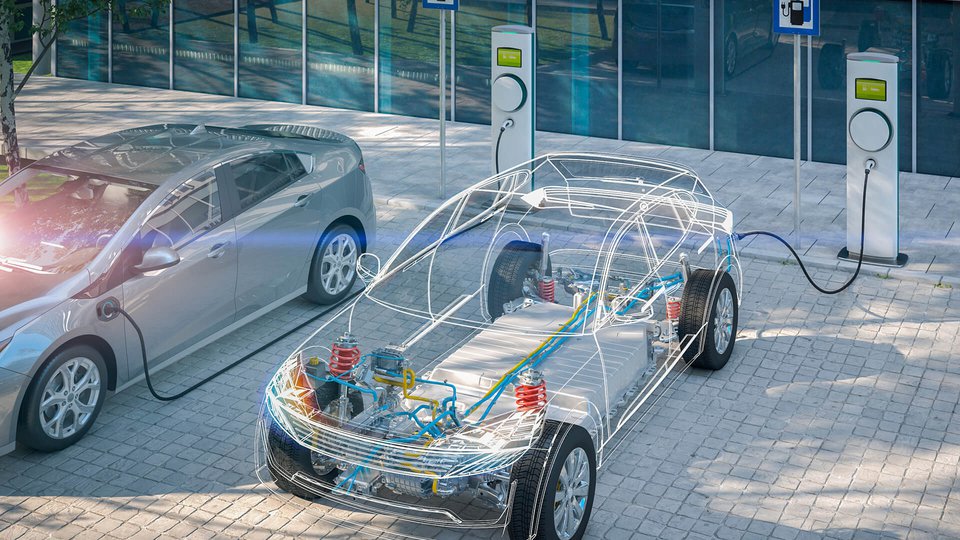The UK is leading the charge on zero emission vehicles.
Zero emission vehicles
The Transitioning to zero emission cars and vans: 2035 delivery plan states the UK’s aim to be the fastest G7 nation to decarbonise vehicles. Petrol, diesel car and van sales will be phased out and all new cars and vans must be fully zero emission at the tailpipe by 2035.
With a £2.8 billion package to support the phase out dates, this ambitious plan will accelerate demand for zero emission vehicles.

Opportunity highlights
There are significant investment opportunities across the UK supply chain. Areas of expansion include:
Battery technologies
- lithium-ion batteries
- lithium iron phosphate batteries
- nickel-metal hydride batteries
- lead-acid batteries (including raw materials mining)
Power electronics, machines and drives
- inverters, converters and on-board chargers to convert and control electric power in Electric Vehicles (EVs)
- battery management systems (BMS)
Magnets
- rare earth magnets used in hybrid and electric vehicles
- non-rare earth magnets
Hydrogen
- Hydrogen fuel cell electric vehicles (FCEVs)
- hydrogen refuelling stations (HRS)
- hydrogen-powered HGVs and buses
- hydrogen fuel-cells
- hydrogen storage tanks
Lightweight materials
- magnesium, carbon fibre composites
- aluminium and matrix composites
- titanium
- glass fibre composites and high-strength steel
Charging infrastructure
- ultra-fast charging stations
- DC charging connectors
- wireless charging
- V2G charging
- roadside charging
- solar roofs
Commercial maturity
The UK is one of the top 10 countries in the world for electric vehicle growth and penetration rates. The Society of Motor Manufacturers and Traders reported that sales of battery and plug-in hybrid vehicles reached 10.7% of total vehicle sales in 2020.
Charging infrastructure is also speeding ahead: the UK ranks fourth in Europe for the number of AC and DC charging installations.
UK battery manufacturing capability is also expected to grow: 2 battery gigafactories have already been announced for Northumberland, and the UK is keen to secure further investment.
Annual sales of new battery electric vehicles are forecast to reach 2.5 million each year in the UK by 2030. Analysis from Deloitte suggests that between £8 billion to £18 billion investment will be required in the EV charge point infrastructure.
UK assets
The UK has regional clusters with strengths across the zero-emission vehicle supply chain.
West Midlands
A centre for the automotive industry and home to the Manufacturing Technology Centre, the National Transport Design Centre, the National Automotive Innovation Centre and Energy Research Accelerator.
Wales
Home to Vale Nickel Refinery in Swansea, which produces high-purity nickel and subproducts for specialist areas. The work of Newport’s National Compound Semiconductor Applications Catapult has potentially significant implications for the EV automotive industry.
North East
Some of the world’s largest automotive original equipment manufacturers, including Nissan and Komatsu, are in the region alongside a global chain of tier-1 suppliers and specialist SMEs.
The North East is home to Europe’s first battery production facility, Envision AESC.
North West
This is a region of thriving engineering and automotive industry and expertise, with assets such as the Energy Lab at the Graphene Engineering Innovation Centre and the Manchester Fuel Cell Innovation Centre.
Oxford-Cambridge Arc and Motorsport Valley®
Oxford is home to the Harwell Campus Energytec Cluster and Faraday Institution. The area is also known as Motorsport Valley, the epicentre of Formula 1 petrol/electric hybrid engine development, and the home of Formula E fully electric racing.
R&D capability
The UK government’s Road to Zero Strategy outlines a range of ambitious measures to facilitate the transition to zero-emission vehicles, including:
- Automotive Transformation Fund (ATF): A substantial £500 million has been released, with a total funding commitment of up to £1 billion. This funding is directed towards capital and research and development (R&D) projects that aim to establish an internationally competitive electric vehicle supply chain.
- Faraday Battery Challenge: A £318 million initiative designed to position the UK as a leader in the design, development, manufacturing, and recycling of electric batteries.
- Driving the Electric Revolution (DER): An £80 million program focused on enhancing the capability and growth of the Power Electronics, Machines, and Drives (PEMD) supply chain within the UK.
- Charging Infrastructure Investment Fund: This £400 million fund is dedicated to expediting the expansion of charging infrastructure, which is crucial to the widespread adoption of electric vehicles.
Additionally, the UK possesses a robust set of R&D assets, including:
- The Advanced Propulsion Centre (and associated Spoke Network)
- 7 centres of the High Value Manufacturing Catapult
- The UK Battery Industrialisation Centre (UKBIC)
- The Centre for Process Innovation
These resources and financial commitments are integral to the UK’s drive towards a cleaner, more sustainable transport ecosystem.
Business and government support
The UK fosters innovation and investment through several schemes, including R&D Tax Relief, Patent Box, and Innovate UK Grants.
The automotive roadmap articulates the government’s dedication to decarbonize road transport and facilitate the transition of the automotive sector toward zero-emission vehicles. It encompasses government policies across six critical domains: supply chain and manufacturing, infrastructure, energy, jobs and skills, regulation, and affordability.
Assistance for the transition towards a cleaner economy is provided through various initiatives, including the Transport Decarbonisation Plan, the Green Paper on a New Road Vehicle CO2 Emissions Regulatory Framework, the 2035 Delivery Plan, and the implementation of Clean Air Zones. These initiatives collectively work to promote sustainability, reduce emissions, and create a more environmentally responsible and economically viable transportation system.



